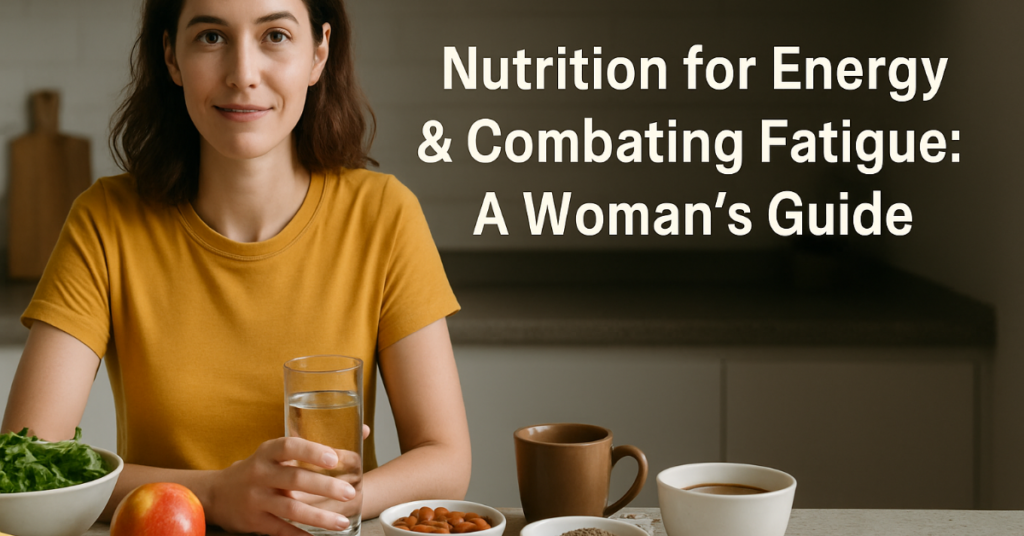In today’s fast-paced world, women often juggle multiple responsibilities—careers, households, parenting, and social obligations—leaving them vulnerable to frequent bouts of fatigue. While it’s easy to attribute this tiredness to stress or lack of sleep, more often than not, the root cause lies in inadequate nutrition. Fatigue is not just a feeling of sleepiness but a persistent lack of energy that can impact both physical and mental performance. This is where a well-balanced, nutrient-rich diet plays a crucial role. Proper nutrition for energy can become a powerful tool in restoring vitality, enhancing productivity, and promoting overall well-being.
Understanding the Root of Fatigue in Women
Women experience unique physiological changes throughout their lives—menstruation, pregnancy, lactation, and menopause—all of which influence their nutritional needs. Additionally, societal roles and the tendency to prioritize others’ needs can lead to skipped meals, restrictive diets, or reliance on convenience foods, which may lack essential nutrients. Common nutritional deficiencies such as iron, vitamin D, B12, and magnesium are particularly known to cause or exacerbate fatigue in women.
The Energy Equation: Calories, Nutrients, and Timing
Energy is derived from calories, but not all calories are created equal. Highly processed foods, sugary snacks, and caffeinated beverages may offer quick energy but often lead to crashes. Instead, women should aim for nutrient-dense foods—those rich in vitamins, minerals, complex carbohydrates, healthy fats, and quality proteins.
Equally important is the timing and distribution of meals. Skipping breakfast or going long hours without eating can cause blood sugar to plummet, leading to lethargy and irritability. Eating small, balanced meals every 3–4 hours can help maintain energy levels and improve focus throughout the day. The consistent fuel supply is key in maintaining nutrition for energy throughout a busy schedule.
Iron: The Foundation of Vitality
Iron deficiency is one of the most common nutritional deficiencies among women, especially those with heavy menstrual cycles. Iron is essential for the production of hemoglobin, which transports oxygen in the blood. Low iron levels can lead to anemia, causing symptoms like extreme tiredness, breathlessness, dizziness, and pale skin.
Food sources of iron: Lean red meat, poultry, fish, eggs, lentils, beans, tofu, spinach, and fortified cereals. To enhance iron absorption, pair these with vitamin C-rich foods like oranges, strawberries, tomatoes, or bell peppers.
B-Vitamins: The Energy Co-Factors
The B-complex group—particularly B12, B6, folate, and riboflavin—plays a central role in converting food into energy. B12 and folate are also vital for nerve function and mental clarity.
Food sources: Eggs, dairy, whole grains, leafy greens, legumes, and meat. Vegetarians or vegans may require B12 supplements or fortified foods since B12 is found primarily in animal products.
Magnesium: The Anti-Fatigue Mineral
Magnesium is involved in over 300 biochemical reactions in the body, many of which relate to energy production. Low magnesium levels may lead to muscle weakness, mental fog, and increased fatigue.
Food sources: Nuts (especially almonds and cashews), seeds (pumpkin and chia), dark chocolate, whole grains, leafy greens, and legumes.
Omega-3s: Brain Fuel
Mental fatigue can be just as draining as physical tiredness. Omega-3 fatty acids support brain health, reduce inflammation, and may help alleviate symptoms of depression, which is often linked to chronic fatigue.
Food sources: Fatty fish like salmon, mackerel, and sardines; walnuts, chia seeds, flaxseeds, and omega-3-enriched eggs.
Also Read: The Silent Heart-Stealer: How Stress Robs Women of Their Heart Health
Complex Carbohydrates: The Steady Energy Source
Carbohydrates are the body’s primary energy source, but it’s important to choose the right kind. Refined carbs (white bread, pastries, sugary drinks) cause rapid spikes and drops in blood sugar. In contrast, complex carbs provide sustained energy and keep blood sugar stable.
Food sources: Whole grains (quinoa, oats, brown rice), starchy vegetables (sweet potatoes, beets), fruits, legumes, and high-fiber foods.
Protein: The Sustainer
Protein supports muscle health, repairs tissues, and keeps you feeling full and energized. Including a protein source in every meal can help balance blood sugar and avoid mid-day crashes.
Food sources: Eggs, Greek yogurt, cottage cheese, chicken, fish, lentils, soy products, and legumes.
Hydration: The Overlooked Energy Booster
Mild dehydration can mimic the symptoms of fatigue. Women often underestimate their daily fluid needs, especially if they consume caffeinated or alcoholic beverages. Drinking adequate water throughout the day helps maintain optimal physical performance and cognitive function.
Tip: Aim for at least 8–10 glasses of water per day. Infuse with lemon, mint, or cucumber for variety. Herbal teas and coconut water are also good hydrating options.
Caffeine: Friend or Foe?
A moderate amount of caffeine can enhance alertness, but relying on it excessively can lead to dependency and energy crashes. It’s wise to consume caffeine in controlled amounts and not as a replacement for meals or sleep.
Healthy caffeine habits: Limit intake to 1–2 cups of coffee or tea daily, avoid sugary energy drinks, and skip caffeine after late afternoon to protect sleep quality.
Lifestyle Complements to Nutrition
While diet is a cornerstone, it works best when paired with other healthy habits. Quality sleep, regular physical activity, stress management, and sunlight exposure all support energy metabolism. Mindful eating, avoiding distractions while eating, and listening to hunger cues can also improve nutrient assimilation and reduce fatigue. Pairing lifestyle habits with consistent nutrition of energy creates a holistic foundation for well-being.
A Sample Energy-Boosting Day
Breakfast: Oatmeal with vegetables, banana slices, chia seeds, tea
Mid-morning snack: Boiled eggs with sprouts salad
Lunch: Brown rice, seasonal vegetables, Fish, plain curd
Afternoon snack: Roasted almond with makhana
Dinner: Stir-fried tofu/ chicken with brown rice and mixed vegetables
Hydration: Water, Dab water,herbal teas, and infused drinks, lasii throughout the day
Final Thoughts
Persistent fatigue isn’t something women should simply accept or power through. Nourishing the body with balanced, whole foods can restore vitality, support hormonal balance, and empower women to thrive in all areas of life. A mindful, nutrient-rich diet focused on nutrition for energy is more than fuel—it is self-care at the cellular level. With just a few intentional changes, energy can be reignited from within.



